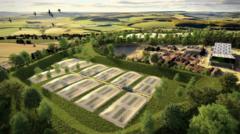Can Growing Food Above Landfills Be the Future of Sustainable Agriculture?

Innovative Greenhouse Project Harnesses Cleaned Carbon Dioxide from Landfill
Plans have emerged for an ambitious project in Wiltshire that aims to revolutionize food production by utilizing "cleaned" carbon dioxide from a landfill site. This groundbreaking initiative, spearheaded by Crapper & Sons Ltd, is set to transform waste management and food sustainability in the area. The company has introduced a community interest company named Sustain Wiltshire and is currently seeking planning permission for the project, which promises to grow fruits and vegetables in greenhouses powered by the landfill's emissions. This unique approach not only seeks to provide fresh produce year-round but also aims to reduce environmental impact and improve food security in local communities.
The Vision for Sustainable Agriculture
The idea behind this project is to create greenhouses that leverage the carbon dioxide produced from the landfill while also utilizing the heat generated during the process. Project Director Nick Ash emphasizes that the CO2 emitted is relatively clean and can significantly enhance plant growth. The greenhouses will be designed to facilitate optimal growing conditions for a variety of crops, including avocados, which are typically not cultivated in the UK.
By capturing and cleaning methane gas from the landfill, the company not only powers its operations but also produces carbon dioxide that can be funneled into the greenhouses. This method represents a potential "world first," as it combines waste management with agricultural innovation. The project aspires to meet up to 80% of the local area’s fruit and vegetable needs, benefiting towns such as Royal Wootton Bassett, Malmesbury, and Brinkworth.
The Process: How It Works
The project comprises several key steps aimed at maximizing efficiency and sustainability:
- Gas Extraction: Methane is extracted from the landfill and cleaned to remove impurities such as hydrogen sulfide.
- CO2 Utilization: The cleaned carbon dioxide is directed into the greenhouses, where it is used to enhance plant growth.
- Waste Management: Waste is processed in fast-reacting gas cells that enable quick gas production while allowing for recycling of materials.
- Portability: The greenhouses are designed to be portable, allowing for easy access to the waste pits underneath for maintenance and new waste input.
This innovative cycle not only creates a sustainable food source but also transforms how waste is managed. By turning what would typically be discarded into a resource, Crapper & Sons Ltd aims to establish a new model for landfill operations.
Benefits of the Project
The Super Midden project is expected to deliver numerous environmental and community benefits, including:
- Reduction of Food Miles: Producing food locally minimizes transportation emissions, ensuring fresher produce reaches consumers.
- Enhanced Food Security: The project aims to provide a consistent and reliable source of food, reducing reliance on external suppliers.
- Waste Reduction: The initiative encourages recycling and efficient waste management, diverting materials from landfills.
- Environmental Restoration: Plans include landscaping the site with grass and trees, improving biodiversity and aesthetics.
Challenges Ahead
While the project is ambitious and promising, it must overcome several challenges before becoming a reality. The biggest hurdle is obtaining the necessary planning permissions from local authorities. Regulatory frameworks surrounding waste management and agricultural practices can be complex, requiring thorough assessments and community consultations.
Moreover, introducing this new methodology may face public skepticism. Educating the community about the benefits of using cleaned carbon dioxide in food production will be essential for gaining support. Effective communication about safety, environmental impacts, and the long-term advantages of the project will play a crucial role in its acceptance.
The Future of Agriculture and Waste Management
The Super Midden project represents a significant step forward in the intersection of agriculture and waste management. As the world grapples with climate change, food security, and waste challenges, innovative solutions like this could pave the way for a more sustainable future. The use of cleaned carbon dioxide in greenhouses is not just an experiment; it could set a precedent for similar initiatives globally.
By combining technology with environmental stewardship, Crapper & Sons Ltd is not only addressing local food needs but also contributing to the global dialogue on sustainability. If successful, this project could inspire other regions to rethink their waste and agricultural practices.
Conclusion: A New Era of Sustainability
The ambitious plans for growing fruits and vegetables using cleaned carbon dioxide in greenhouses above a landfill site in Wiltshire could usher in a new era of sustainable agriculture. By harnessing waste as a resource, Crapper & Sons Ltd is redefining the relationship between food production and waste management. With community support and proper planning, this project could lead to significant advancements in local food security, environmental health, and innovative waste recycling methods.
As we look to the future, the question remains: how can other communities adopt similar sustainable practices to benefit both their local economies and the environment? The Super Midden project may serve as a model for others to follow.
Frequently Asked Questions (FAQs)
What is the Super Midden project?
The Super Midden project is an initiative by Crapper & Sons Ltd to grow fruits and vegetables in greenhouses using cleaned carbon dioxide from a landfill site in Wiltshire, aiming to enhance food security while promoting sustainable waste management.
How will the project benefit the local community?
The project is expected to provide fresh produce year-round, reduce food miles, improve food security, and promote efficient waste management practices within the community.
What types of crops will be grown in the greenhouses?
The greenhouses are planned to grow various crops, including avocados and other fruits and vegetables typically not grown commercially in the UK.
What challenges does the project face?
The main challenges include obtaining planning permission, addressing public skepticism, and ensuring effective communication about the project's benefits and safety measures.
How does using cleaned carbon dioxide enhance plant growth?
Growing plants in a controlled environment with enriched carbon dioxide improves photosynthesis, leading to healthier and faster growth compared to traditional air conditions.
As we explore innovative solutions for food production and waste management, what other creative ideas could communities implement to foster sustainability and resilience? #SustainableAgriculture #WasteManagement #FoodSecurity
Published: 2025-07-16 10:14:08 | Category: technology



